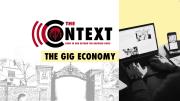This is the eighth post of "The Context"—a biweekly series of archival stories—offering our readers a useful background to some of the most important subjects in the news today. We hope you enjoy it.
The future of the gig economy will likely be put on the ballot again—this time in Massachusetts. According to a recent Boston Globe article, a coalition of tech companies is preparing to submit a referendum for public vote that would allow the group to “continue classifying Uber, Lyft, Instacart, and DoorDash drivers and deliverers as independent contractors, not employees.” The push is strongly opposed by labor groups, setting the stage for a lengthy and expensive public battle that could resemble the recent fight over Proposition 22 in California.
The language from the ballot would grant these workers benefits that they don’t currently receive, including health-care stipends, paid sick time, paid family and medical leave, and occupational insurance. But labor advocates say that these benefits are inferior to those that could be granted if they were simply designated as employees.
At Harvard Magazine, we’ve written extensively about the present and future of labor. One of our recent highlights on the subject is this 2017 profile of Shannon Liss-Riordan ’90, J.D.’96, co-founder of Lichten & Liss-Riordan, P.C., a prominent employment-law practice in Boston. The story begins with a courtroom anecdote in which Liss-Riordan tries to secure overtime for 25 assistant managers at a discount retail store. It transitions into a wider examination of wage theft and other examples of employee exploitation. The classification of workers plays a significant role in Liss-Riordan’s work. Former associate editor Marina Bolotnikova described her interpretation of Uber’s employee classification this way:
What Silicon Valley libertarians view as a revolution in work—workers get to be their own micro-entrepreneurs, without any of the hassle of employment—Liss-Riordan views as a scam to steal wages. Uber argues that it lets drivers set their own schedules, she says, but a lot of workers get to choose their hours—that doesn’t mean they aren’t employees. Uber also sets drivers’ rates and performance standards, and relies on their labor for its income—all qualities of a managed labor force.
This report on “alternative work arrangements” and the erosion of quality job opportunities addresses important issues such as outsourcing. While some freelancers choose their hours, set their own rates, and accept interesting work, on-call or temporary workers get a rougher deal, said Allison professor of economics Lawrence F. Katz. Instead of attempting to restore certain kinds of jobs that have disappeared, he thinks the government should help make these “alternative” jobs more meaningful, in pay and career-development opportunities. That could mean supporting “portable-benefits systems” at companies like Uber that would allow workers to pay into a fund for health insurance and retirement benefits—regardless of how their employer classifies them.
I’d also recommend this rich op-ed essay on automation by Ascherman professor of economics Richard Freeman to those interested in the future of work. Will more robots mean fewer jobs? How might they improve or worsen the daily experience of work? Those questions and more are thoughtfully answered throughout—often in unexpected ways.
More from “The Context”
- Affirmative Action and Harvard: Recent and archival work on litigation in admissions
- Life on the Mesopotamian Marshes—and the Specter of Drought: Past work on water and human intervention
- How Exercise Gives Us Purpose: Reviewing our best articles on exercise
- Arthur C. Brooks on "Revenge Bedtime Procrastiination": Presenting our best archival work on sleep
- Universities Pushed to Reckon with Slavery: Students and activists advocate for institutional change.
- Simpsons Writer John Swartzwelder on Comedy: Sharing some of our best work on comedians and their craft
- Daniel Lieberman on Food Addiction: Framing the news with our best articles on diet and health









